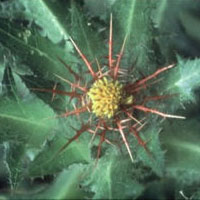Blessed Thistle
Uses
Parts Used & Where Grown
Although native to Europe and Asia, blessed thistle is now cultivated in many areas of the world, including the United States. The leaves, stems, and flowers are all used in herbal preparations.
Our proprietary “Star-Rating” system was developed to help you easily understand the amount of scientific support behind each supplement in relation to a specific health condition. While there is no way to predict whether a vitamin, mineral, or herb will successfully treat or prevent associated health conditions, our unique ratings tell you how well these supplements are understood by the medical community, and whether studies have found them to be effective for other people.
For over a decade, our team has combed through thousands of research articles published in reputable journals. To help you make educated decisions, and to better understand controversial or confusing supplements, our medical experts have digested the science into these three easy-to-follow ratings. We hope this provides you with a helpful resource to make informed decisions towards your health and well-being.
3 StarsReliable and relatively consistent scientific data showing a substantial health benefit.
2 StarsContradictory, insufficient, or preliminary studies suggesting a health benefit or minimal health benefit.
1 StarFor an herb, supported by traditional use but minimal or no scientific evidence. For a supplement, little scientific support.
This supplement has been used in connection with the following health conditions:
| Used for | Why |
|---|---|
1 Star Indigestion, Heartburn, and Low Stomach Acidity Refer to label instructions | Blessed thistle acts as a digestive stimulant and may be helpful for indigestion. Bitter herbs are thought to stimulate digestive function by increasing saliva production and promoting both stomach acid and digestive enzyme production. As a result, they are particularly used when there is low stomach acid but not in heartburn (where too much stomach acid could initially exacerbate the situation). These herbs literally taste bitter. Some examples of bitter herbs include greater celandine, wormwood, gentian,dandelion, , yarrow, devil’s claw, bitter orange, bitter melon, juniper, andrographis, prickly ash, and centaury.. Bitters are generally taken either by mixing 1–3 ml tincture into water and sipping slowly 10–30 minutes before eating, or by making tea, which is also sipped slowly before eating. |
1 Star Poor Digestion Refer to label instructions | Folk medicine used blessed thistle tea for digestive problems, including gas, constipation, and stomach upset. Folk medicine used blessed thistle tea for digestive problems, including gas, constipation, and stomach upset. Certain compounds, sesquiterpene lactones, such as cnicin, provide the main beneficial effects of blessed thistle in the treatment of indigestion. The bitterness of these compounds stimulates digestive activity, including the flow of saliva and secretion of gastric juice, which leads to improved appetite and digestion. |
Traditional Use (May Not Be Supported by Scientific Studies)
Folk medicine used blessed thistle tea for digestive problems, including gas, constipation, and stomach upset. This herb was also used—like its well-known relative, milk thistle1—for liver and gallbladder diseases.
How It Works
The sesquiterpene lactones, such as cnicin, provide the main beneficial effects of blessed thistle in the treatment of indigestion. The bitterness of these compounds stimulates digestive activity, including the flow of saliva and secretion of gastric juice, which leads to improved appetite and digestion.2 Some pharmacological evidence suggests that blessed thistle may also have anti-inflammatory properties.3
How to Use It
The German Commission E monograph recommends 4–6 grams of blessed thistle per day.4 Alternatively, tincture (1/2 teaspoon [2 ml] three times per day) may be used. Approximately 1/2 teaspoon (2 grams) of the dried herb can also be added to 1 cup (250 ml) of boiling water and steeped 10 to 15 minutes to make a tea. Three cups can be drunk each day.
Interactions with Supplements, Foods, & Other Compounds
Interactions with Medicines
Side Effects
Blessed thistle is generally safe and is not associated with side effects. Anyone with allergies to plants in the daisy family should use blessed thistle cautiously.
1. Lust JB. The Herb Book. New York: Bantam Books, 1974, 343.
2. Bradley PR (ed). British Herbal Compendium, vol 1. Bournemouth, Dorset, UK: British Herbal Medicine Association, 1992, 126-7.
3. Foster S. 101 Medicinal Herbs. Loveland, CO: Interweave Press, 1998, 32-3.
4. Blumenthal M, Busse WR, Goldberg A, et al. (eds). The Complete Commission E Monographs: Therapeutic Guide to Herbal Medicines. Boston, MA: Integrative Medicine Communications, 1998, 92.
Last Review: 06-08-2015

Copyright © 2024 TraceGains, Inc. All rights reserved.
Learn more about TraceGains, the company.
The information presented by TraceGains is for informational purposes only. It is based on scientific studies (human, animal, or in vitro), clinical experience, or traditional usage as cited in each article. The results reported may not necessarily occur in all individuals. For many of the conditions discussed, treatment with prescription or over the counter medication is also available. Consult your doctor, practitioner, and/or pharmacist for any health problem and before using any supplements or before making any changes in prescribed medications. Information expires December 2024.
This information does not replace the advice of a doctor. Ignite Healthwise, LLC, disclaims any warranty or liability for your use of this information. Your use of this information means that you agree to the Terms of Use. Learn how we develop our content.

